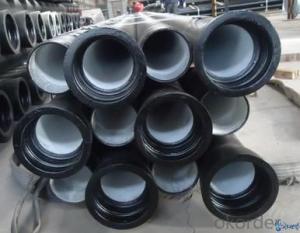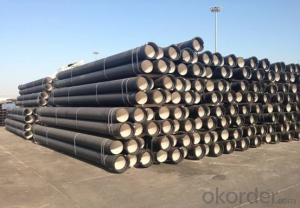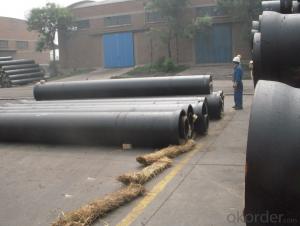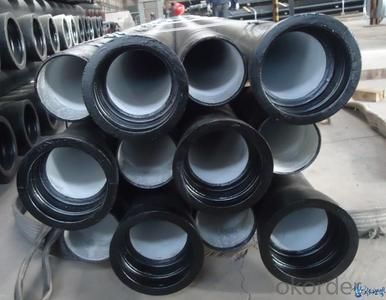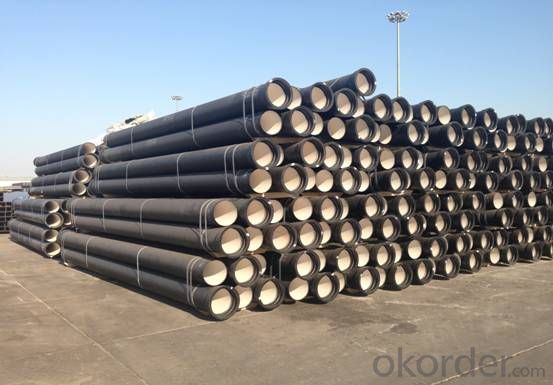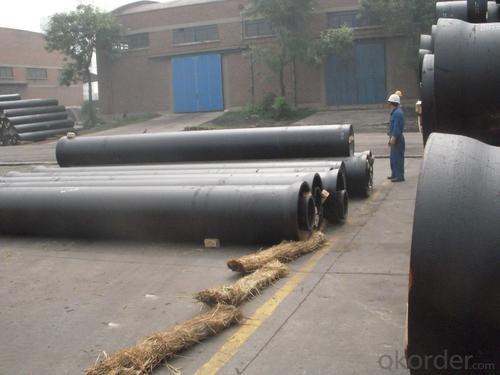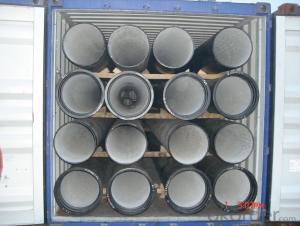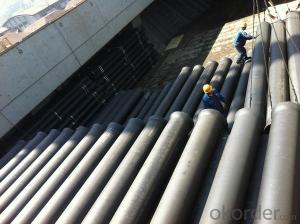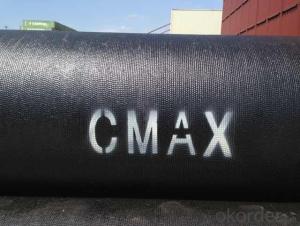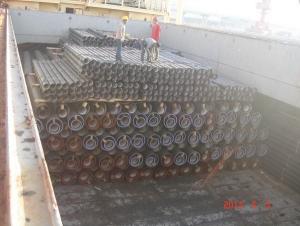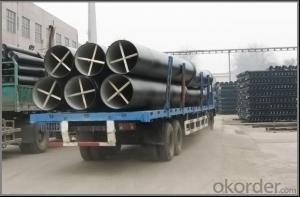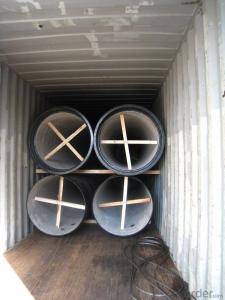DUCTILE IRON PIPES K7 DN300
- Loading Port:
- China Main Port
- Payment Terms:
- TT or LC
- Min Order Qty:
- 1 pc
- Supply Capability:
- -
OKorder Service Pledge
OKorder Financial Service
You Might Also Like
Ductile Iron Cast Pipe is without any defects compare with tradition casting tech, which has many advantages particularly as follow:
(1) High density. In the "vertical upward casting" process, the melt iron of centre liquid column in center crystallizer is continuously feeding for volume shrinkage caused by condensation tube at outer circumference , which lead to be free of shrinkage porosity.
(2) High purity. When melt iron pouring, the mixed impurities such as gas, dross, sand grain which are lighter than melt iron could be eliminated at furnace mouth, its impossible to enter into the crystallizer through the channel, so the melt iron into the crystallizer is very pure.
(3) Strength with toughness. The cooling speed provided by continuous crystallizer is 30 times than sand casting and 5 times than centrifugal casting, and doesn't produce white iron, the eutectic cell volume of continuous cast iron is one eighth to one tenth compare with traditional cast iron. The density of graphite nodule in ductile iron can reach 300-700 pcs/mm2. Therefore, all reason above improve the strength and toughness of continuous cast iron.
(4) Free machining. The high speed cooling make the hardening phase (such as boride, steadite) not appear like reticular, massive or thick, but diffuse like fish bone and pane in shape, moreover, there are tiny graphite flakes inlaid hardening phase. It's free machining in BrinellHardness the range of 250-300HB. However, the Brinell Hardness of 250 is top limit to common metal materials.
(5) High productivity. To the wall thickness of tube under 10mm, the speed of continuous casting is 1 meter/min, to the wall thickness of tube under 20mm, the speed of continuous casting is 0.5 meter/min, which is high efficiency that centrifugal or other casting tech couldn't reach.
Features of Ductile Iron Pipes:
. Ductile Iron Pipe offers proven reliability and the quality.
. It is quick and easy installation.
. The ductile iron pipe has high pressure capability.
- Q: How do ductile iron pipes perform in acidic soil conditions?
- Ductile iron pipes are known for their durability and resistance to various environmental conditions, including acidic soil conditions. When exposed to acidic soil, ductile iron pipes demonstrate excellent corrosion resistance due to their unique composition and protective coating. The high carbon content in ductile iron pipes provides them with inherent resistance to corrosion, even in acidic environments. Additionally, the pipes are typically lined with cement mortar or a suitable epoxy coating, which acts as an additional layer of protection against acid attack. The combination of the high carbon content and protective coating creates a barrier that prevents the acid from directly contacting the iron, thus minimizing the risk of corrosion. This ensures that the pipes remain structurally sound and maintain their integrity over an extended period of time. Furthermore, ductile iron pipes have a long service life and are designed to withstand a wide range of soil conditions. Their inherent strength and flexibility enable them to endure the stresses and strains caused by the surrounding soil, including acidic soil environments. This makes them an ideal choice for applications where the soil has a higher acidity level. It is important to note that while ductile iron pipes perform well in acidic soil conditions, the severity and concentration of the acid can impact their performance. In extremely aggressive or highly concentrated acidic environments, additional corrosion protection measures may be necessary, such as the use of sacrificial anodes or cathodic protection systems. In conclusion, ductile iron pipes are highly resilient and perform exceptionally well in acidic soil conditions. Their corrosion resistance, combined with their robust structure and protective coating, ensures their longevity and reliability, making them a preferred choice for various applications in such environments.
- Q: How are ductile iron pipes connected?
- There are several methods commonly used to connect ductile iron pipes, including flanged joints, mechanical joints, and push-on joints. Flanged joints involve connecting two sections of pipe by using a flanged coupling. The pipe ends have flanges that are securely bolted together, creating a connection that is both strong and leak-proof. This method is often used for pipes with larger diameters or in situations where a rigid joint is necessary. Mechanical joints use a mechanical joint gland and rubber gasket to create a seal that is watertight. The ends of the pipes are inserted into the gland, and then bolts are tightened to compress the gasket, ensuring a reliable connection. This method is frequently employed in water distribution systems because it is flexible and easy to install. Push-on joints utilize a rubber gasket to create a tight seal between sections of pipe. The gasket is placed in a groove on one end of a pipe, and then the other pipe is pushed onto it, resulting in a compression seal. This method is quick and straightforward, making it suitable for a variety of applications, such as sewer systems and underground piping. Ultimately, the choice of connection method for ductile iron pipes depends on factors such as pipe diameter, application requirements, and installation conditions. It is of utmost importance to adhere to the manufacturer's recommendations and industry standards to ensure proper installation and dependable performance.
- Q: Can ductile iron pipe be used for mining applications?
- Yes, ductile iron pipe can certainly be used for mining applications. Ductile iron is a type of cast iron that exhibits significant tensile strength, flexibility, and durability, making it suitable for demanding and rugged environments like mining. Its high strength-to-weight ratio allows for easy handling and installation, making it a cost-effective choice for mining operations. Ductile iron pipes are resistant to corrosion and have excellent mechanical properties, including high impact and fatigue resistance. These properties make them ideal for transporting various materials commonly found in mining, such as water, slurries, and abrasive ores. Additionally, ductile iron pipes have a long lifespan, ensuring reliable performance and minimal maintenance requirements in mining operations. Furthermore, ductile iron pipes can withstand high pressures and maintain their integrity under extreme conditions, making them suitable for underground mining applications. They can handle the demanding requirements of deep mining operations, including the transport of water for cooling or dust suppression, as well as the drainage of wastewater or mine dewatering. Overall, ductile iron pipes provide the necessary strength, resilience, and corrosion resistance required for mining applications. Their versatility, durability, and ease of installation make them a valuable choice for mining operations, ensuring efficient and reliable material transport while minimizing downtime and maintenance costs.
- Q: How do ductile iron pipes handle extreme temperatures?
- Ductile iron pipes, known also as cast iron pipes, possess the ability to effectively handle extreme temperatures. The material composition of ductile iron enables it to endure both high and low temperatures without experiencing significant damage or degradation. When exposed to high temperatures, ductile iron pipes demonstrate exceptional thermal resistance, rendering them suitable for applications involving the transportation of hot liquids or gases. The high melting point of ductile iron, ranging from 2060°C to 2200°C, guarantees that the pipes can withstand extreme heat without melting or distorting. Consequently, these pipes are ideal for utilization in industries such as oil and gas, steam distribution, and high-temperature water supply systems. Likewise, ductile iron pipes exhibit satisfactory performance in low-temperature environments. They possess a low coefficient of thermal expansion, thereby enabling them to endure the expansion and contraction that occurs during temperature fluctuations without cracking or fracturing. This quality makes them appropriate for use in cold climates or in applications involving the transportation of chilled liquids or gases. Furthermore, ductile iron pipes possess excellent thermal conductivity, allowing them to efficiently dissipate heat. This characteristic proves particularly significant in high-temperature applications where effective heat transfer is vital to prevent damage to the pipes or the materials being transported. In conclusion, ductile iron pipes effectively handle extreme temperatures due to their high melting point, low coefficient of thermal expansion, and exceptional thermal conductivity. These attributes establish them as a dependable choice for various applications involving extreme temperature conditions.
- Q: Are ductile iron pipes suitable for use in desalination plants?
- Desalination plants necessitate a dependable and long-lasting piping system to convey treated water to various destinations. Ductile iron pipes, famed for their strength, flexibility, and corrosion resistance, are truly an ideal choice for such plants. These pipes, crafted from a variant of cast iron fortified with magnesium, possess a heightened tensile strength that allows them to endure the pressures linked to the desalination process. Additionally, desalination plants often employ chemicals and other treatment methods to eliminate impurities from the water. Ductile iron pipes exhibit remarkable resistance to corrosion caused by these chemicals and can endure the harsh conditions present in desalination plants without deteriorating over time. This ensures the longevity and dependability of the piping system, consequently minimizing the chances of leaks or failures. Moreover, ductile iron pipes feature a sleek inner surface, which aids in diminishing friction and pressure loss during water flow. This aspect carries significant importance in desalination plants, where efficiency is paramount for the overall functioning of the facility. The smoothness of ductile iron pipes facilitates efficient water flow, thereby reducing energy consumption and optimizing the desalination process. In conclusion, ductile iron pipes are an appropriate choice for utilization in desalination plants due to their strength, flexibility, corrosion resistance, and smooth inner surface. These pipes provide a reliable and durable piping system capable of withstanding the elevated pressures, harsh chemicals, and demanding conditions prevalent in desalination plants.
- Q: How do ductile iron pipes handle ground movement near rivers and lakes?
- Ductile iron pipes are well-suited to handle ground movement near rivers and lakes due to their unique properties and construction. These pipes are made from a type of cast iron that is known for its high strength and flexibility, making them highly resistant to ground movement and other external forces. One of the key features of ductile iron pipes is their ability to withstand bending and stretching without breaking. This flexibility allows the pipes to adapt to ground movements, whether they are caused by natural factors like soil settling, erosion, or even seismic activity. The pipes can absorb and distribute the stress caused by ground movement, reducing the risk of cracks or fractures. Additionally, ductile iron pipes have a high impact resistance, which means they can withstand external forces such as pressure from shifting soil or heavy equipment. This makes them less susceptible to damage during ground movements near rivers and lakes where erosion or flooding can occur. Furthermore, ductile iron pipes have a smooth internal surface, which reduces friction and resistance to flow. This ensures efficient water transportation even in areas with ground movement, preventing any potential blockages or disruptions to the water supply system. To enhance their resistance to ground movement, ductile iron pipes are often installed using flexible joints, such as restrained joints or push-on joints, depending on the specific project requirements. These joints allow the pipes to move slightly without causing damage to the overall system, providing additional protection against ground movement near rivers and lakes. In summary, ductile iron pipes are highly capable of handling ground movement near rivers and lakes due to their strength, flexibility, impact resistance, and smooth internal surface. These qualities make them a reliable choice for water transportation systems in areas prone to ground movement, ensuring a durable and efficient infrastructure for the supply of water.
- Q: What is the excavation width of ductile iron pipes with diameters greater than 1400?
- Because of differences in depth and soil properties, the excavation width is differentUsually to ensure that the width of bottom surface on both sides of the 600 1400+ manual operation. (such a large pipe flange bolt, the tool is not easy to expand, so the need for manual operation. So wide)
- Q: How long does the cast iron pipe of indoor direct buried sewage need to be examined?
- UPVC, also called hard PVC, is an amorphous thermoplastic resin made by polymerization of vinyl chloride monomer, with certain additives (such as stabilizers, lubricants, fillers, etc.). In addition to additives, the method of blending with other resins is also applied to make it have obvious practical value. These resins are CPVC, PE, ABS, EVA, MBS and so on. UPVC has high melt viscosity and poor flowability. Even if the pressure and melt temperature are increased, the fluidity is not changed. In addition, the molding temperature of the resin is very close to the thermal decomposition temperature, and the molding temperature range is very narrow. It is a difficult material to be formed.
- Q: Are ductile iron pipes suitable for use in food processing plants?
- Yes, ductile iron pipes are suitable for use in food processing plants. Ductile iron is highly durable and corrosion-resistant, making it suitable for transporting various fluids in food processing facilities. Additionally, ductile iron pipes are approved for use in potable water systems, further indicating their suitability for food-related applications.
- Q: Are ductile iron pipes suitable for use in brewery facilities?
- Yes, ductile iron pipes are suitable for use in brewery facilities. Ductile iron pipes are durable, corrosion-resistant, and can withstand high-pressure applications, making them ideal for transporting water, steam, and other fluids within brewery facilities. Additionally, the smooth interior surface of ductile iron pipes minimizes friction and prevents the build-up of sediments or organic materials, ensuring the purity and quality of the beer being produced.
Send your message to us
DUCTILE IRON PIPES K7 DN300
- Loading Port:
- China Main Port
- Payment Terms:
- TT or LC
- Min Order Qty:
- 1 pc
- Supply Capability:
- -
OKorder Service Pledge
OKorder Financial Service
Similar products
Hot products
Hot Searches
Related keywords
